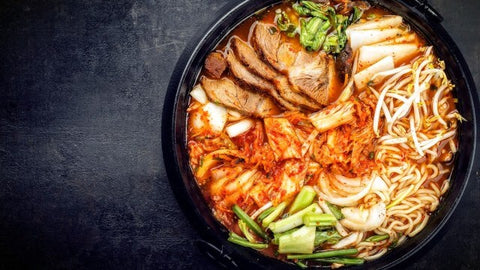Ditch these eats when your mental and emotional resilience is tapped out.
When it feels like tension and anxiety are eating you alive, the last thing you want to do is chow down on foods that could make you feel even worse. That’s right, what you eat can help support your mental health—or pile on the challenges.
How so? The gut and brain are directly connected through the vagus nerve, creating a highway of constant communication. Plus, close to 95% of serotonin receptors (the happiness hormone) reside in your gut, so what you eat can have a huge impact on your emotional health.McDonalds French Fries | $50 Food Challenge!
“We now know inflammation is the number one cause for mental health conditions like anxiety, depression, and fatigue,” says Dr. Uma Naidoo, MD, Harvard-trained nutritional psychiatrist, professional chef, and author of This Is Your Brain on Food.
In other words, “gut inflammation is brain inflammation,” says Dr. Naidoo. The biggest culprit? Highly processed foods—exactly what we often crave when we’re stressed.
“Processed foods are incredibly good at creating a high dopamine response, which increases our desire to want more of the same. When dopamine levels decrease, moods sharply decrease,” says dietitian Alisa Bloom, MPH, RDN. To avoid that crash, we seek out more processed foods to stimulate the dopamine effect, and, over time, we need even more processed foods to get the same feeling, explains Bloom.
Knowing this, the next time you’re feeling extra-stressed, steer clear of the following foods—they’ll only exacerbate your anxious feelings. 1
Caffeine

Anything beyond two cups of coffee increases inflammation and ups your stress hormones (like cortisol and adrenaline). Even if you’re among those who don’t feel the caffeine jitters, it’s still wise to curb your caffeine intake. “The dampening of those normal effects of caffeine can be a signal the adrenal glands may be overworked,” says Bloom, who suggests swapping some coffee for green or black tea that is rich in L-theanine, an adaptogen that helps the body’s natural stress response. (Fun fact: Taylor Swift takes L-theanine supplements.)
RELATED: Ugly Side Effects of Drinking Too Much Coffee, According to Science 2
Sugar

A diet high in sugar “increases insulin resistance” and spurs “an imbalance in the gut microbiome creating inflammation in the body and the brain,” says Dr. Naidoo. “Neuroinflammation leads to increased levels of anxiety, depression, and mental fatigue.”
However, it’s not enough to avoid the obvious sugar bombs (like a bowl of ice cream or cookies). Sugar hides in many unexpected foods, such as granola bars, yogurt, fruit snacks, pasta sauce—even ketchup! So look out for sneaky added sugars on nutrition labels.https://5ecd9de6c69d59574fe1a53389067aa7.safeframe.googlesyndication.com/safeframe/1-0-38/html/container.html
If you’re fighting your sweet tooth and losing, at least steer clear of the unhealthiest snacks to eat when you’re craving sugar. 3
Refined Carbs

Also known as “simple carbs,” refined carbs have been stripped of their nutritional value, so you’re left with empty calories. They also lack fiber, which slows your digestion and gives your body fuel for the long haul. This is why refined carbs lead to drastic spikes in blood sugar.
For many people, gluten acts as an inflammatory food and “can also be a trigger for anxiety or depression,” says Dr. Naidoo. 4
Breakfast Cereal

Cereal may be a quick, go-to breakfast, but it doesn’t boast very much nutritional value. More often than not, it’s actually “a highly processed food laden with sugar,” says Dr. Naidoo. Spiking your blood sugar levels first thing in the morning means setting yourself up for an insulin rollercoaster throughout the day, which can really mess with your mood. You’d get more out of “a fiber-rich oatmeal or homemade chia pudding instead,” advises Dr. Naidoo. 5
Artificial Sweeteners

Fake sugars—like aspartame, sucralose, and saccharin—which usually come in brightly colored packets, can bring on some concerning side effects, including disrupting the gut microbiome. “Most artificial sweeteners (especially when consumed on an empty stomach) trick the body into thinking they are actually food, causing an insulin response and an increased desire to eat,” says Bloom. Keep an eye out for foods labeled “reduced sugar” or “low calorie”—that’s usually a hint that the real sugar has been replaced with an artificial sweetener.
To get the full lowdown on sweeteners, here’s every popular added sweetener—ranked! 6
Processed Meats

Pumped with preservatives and additives, meats like sausages, salami, deli meats, jerky—and yes, bacon (sigh…)—are processed with additives to retain their flavoring. These additives (like sodium nitrite, which is used to preserve the pink color in meat) disrupt gut health, leading to low energy and mood shifts, and have even been linked to stomach and bowel cancer.https://5ecd9de6c69d59574fe1a53389067aa7.safeframe.googlesyndication.com/safeframe/1-0-38/html/container.html 7
Soda

Our cells contain magnesium—a vital nutrient for body function. When our “bodies experience that acute fight-or-flight stress response, calcium crosses over into the cells and magnesium needs to be there to kick it back out and return that cell to its rest state,” says Nina Dahan, MS, RD, a registered dietitian in Brooklyn, New York. Besides being loaded with sugar, “dark sodas contain phosphoric acid, which competes with magnesium absorption,” adds Dahan. Translation? Your favorite cola or root beer is actually making it harder for you to destress! 8
Alcohol

The link between depression and alcohol is well documented. Alcohol is a known depressant that disrupts the gut microbiome and increases inflammation throughout the gastrointestinal tract.
While you may think they’re putting you at ease, cocktails often contain a lot of sugar in the form of mixers (think: margaritas and daiquiris), and can increase blood sugar swings, disrupting your sleep in the process. And when stress levels are high, getting more sleep is one of the best things you can do! 9
Processed Vegetable Oils

Contrary to their name, vegetable oils—like canola, sunflower, safflower, corn, or grapeseed—contain no vegetables. These processed oils are filled with harmful omega-6 fats that increase inflammation and disrupt the gut microbiome.
Some experts even argue that processed vegetable oils are worse than sugar! Not only are they snuck into packaged snacks and pre-made baked goods to extend their shelf lives, but they’re also a go-to for restaurants to cook with because they’re cheap. You may not have control over what oils are in your takeout foods, but you can choose to cook at home using anti-inflammatory fats, such as olive oil and grass-fed butter.
To combat inflammation, try incorporating these 30 best anti-inflammatory foods into your diet.




